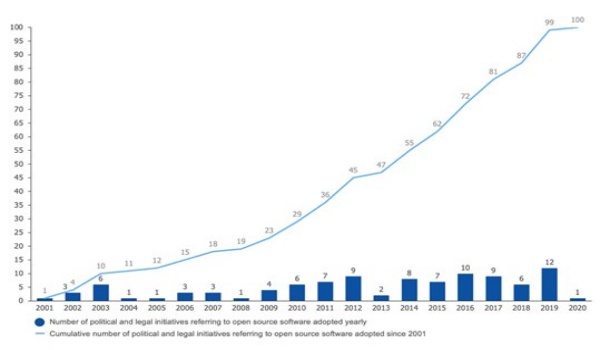A key finding from OSOR's report on Open Source
Here is a curve that must not flatten!

The chart above has been recently tweeted by @OsorEU, with this caption:
“Political and legal initiatives addressing #opensource software are on the rise throughout Europe, from one initiative in 2001 to 100 initiatives in 2020!"
The tweet also links the full OSOR report on the status of Open Source Software (OSS) policies in Europe, 2020.
And here is the
Some takeaways of the OSOR report on the status of Open Source Software (OSS) policies in Europe, 2020:
The importance of OSS in public sector across Europe is affirmed by governments increasingly incorporating OSS as part of their country’s political and legal framework, with 26 out of the 28 countries studied having put in place legal and political initiatives referring to OSS.
The first identified initiative within the policy and legal framework addressing OSS dates back to 2001. Since then, every year, both political and legal initiatives have increased significantly, reaching a total of 100 initiatives over the course of two decades.
Although OSS is just one digital technology that can help guide the digital transformation, the benefits afforded to users in terms of transparency, adaptability, and collaborative potential positions OSS as a highly unique offering available to all public sector bodies.
This report highlights the impact of this gradual realisation across Europe, culminating in the implementation of various OSS initiatives and the establishment of OSS bodies.
Here are the takeaways I consider most important:
Most of the OSS initiatives (66%) are led by the 18 countries which have adopted a policy and legal framework explicitly addressing OSS.
However, the research found that it is not necessary for a country to have a designated governmental actor addressing this subject matter.
Indeed, eight countries were found to have implemented political or legal initiatives focusing exclusively on OSS without having a designated governmental actor responsible for OSS in their country.
Translation of the last two paragraph:
Dear bureaucrats, and lawmakers: enough of high sounding edicts! Just do Open Source. If there is the will, there is no need to create a dedicated ministry, agency or department for something like this. Just do it.
Concluding with the words of OSOR, “it is hoped that this positive trend will continue in the years to come”.
Who writes this, why, and how to help
I am Marco Fioretti, tech writer and aspiring polymath doing human-digital research and popularization.
I do it because YOUR civil rights and the quality of YOUR life depend every year more on how software is used AROUND you.
To this end, I have already shared more than a million words on this blog, without any paywall or user tracking, and am sharing the next million through a newsletter, also without any paywall.
The more direct support I get, the more I can continue to inform for free parents, teachers, decision makers, and everybody else who should know more stuff like this. You can support me with paid subscriptions to my newsletter, donations via PayPal (mfioretti@nexaima.net) or LiberaPay, or in any of the other ways listed here.THANKS for your support!